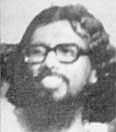
2nd January 2000

![]()
Days of terror
 Soon
after Ms. Sirimavo Bandaranaike and her leftist allies - the Trotskyites
and Communists swept into office at the 1970 general elections, the Janatha
Vimukthi Peramuna (JVP) which had supported them, turned tables on the
left coalition. Comprising mainly of youth from rural areas and predominantly
drawn from the underprivileged segment of society, the JVP was led by a
Marxist dropout from Moscow's Patrice Lumumba University – Rohana Wijeweera.
Soon
after Ms. Sirimavo Bandaranaike and her leftist allies - the Trotskyites
and Communists swept into office at the 1970 general elections, the Janatha
Vimukthi Peramuna (JVP) which had supported them, turned tables on the
left coalition. Comprising mainly of youth from rural areas and predominantly
drawn from the underprivileged segment of society, the JVP was led by a
Marxist dropout from Moscow's Patrice Lumumba University – Rohana Wijeweera.
The JVP's aim was the classic Marxist – almost Maoist theory of attaining power through the barrel of the gun. Armed revolution was their credo; a proletarian government their ultimate objective.
On the night of April 5, 1971, JVP cadres armed with shotguns and home-made bombs (explosives inside empty condensed milk tins) attacked police stations at Warakapola, Deniyaya, Alawwa etc.
The poorly equipped policemen shot back. The Army was called in and a State of Emergency declared.
Extract from 'Sri Lanka Army- 50 Years On':
"The Army together with other security forces and the Police under the direction of the National Security Council had to meet this unprecedented threat of armed rebellion. The armed forces lacked arms, ammunition, communication equipment and mobility to meet this threat. There was also an inadequacy of troops due to severe financial restrictions imposed by successive governments who lived in a world of make-believe that their success at general elections proved their popularity with the people. Intelligence gathering was directed more towards opposing political parties rather than towards possible subversion. The state of unpreparedness to meet this threat was primarily due to these factors, whereas morale and the fighting capability of the forces could be mustered in a short space of time because of the state of discipline in the forces.
"In the meanwhile the government appealed to friendly nations to provide assistance to counter the threat. It is a tribute to the foreign policy of the nation that there was a rapid response from diverse group of nations. India provided an infantry battalion which was used to protect the international airport, a team of advisors led by Brig. Ken Joshua who was then Deputy Director General of Military Training and a clutch of helicopters to provide mobility and a rapid deployment of troops. They also supplied small arms, ammunition and grenades. Pakistan too provided helicopters and military assistance. The USA, the USSR, China, Yugoslavia, Britain and other countries provided assistance in the way of equipment which was either gifted or paid for on concessional terms. Whilst all these were gratefully acknowledged at the time, the wide variety of equipment on inventory became a logisticians' nightmare later."
The JVP putsch was thwarted a few weeks after it began. Wijeweera and a host of its leaders were taken into custody. A special tribunal -- the Criminal Justice Commission dispensed with the normal laws of criminal procedure and evidence -- was set up. The leaders were jailed. The junior cadres were gradually released back to society.
In 1977, President J.R Jayewardene released Wijeweera in the hope that he and the JVP would return to mainstream politics.
Wijeweera contested the 1982 Presidential elections and lost to Jayewardene but the following year President Jayewardene banned the JVP for alleged complicity in the anti-Tamil riots of 1983: Wijeweera and Co. went underground.
In 1987, the JVP showed its true colours once again when they re-emerged, instigating a violent campaign to overthrow the government.
A strategy of brutal assassinations of Members of Parliament, Grama Sevaka Niladharis, death threats and the distribution of chits demanding the closure of shops and declaring 'curfews' resulted in the government of the day coming to a virtual standstill.
Fear psychosis was the key to their destabilising methods. The Armed Forces, loyal to the government, hit back with a vengeance.
Using force to meet force, the Forces adopted unconventional tactics, including the use of hit-squads comprising men in certain garb to instill fear in JVP suspects and drive home the message that fear will also be met with fear.
Hundreds of innocent youth became enmeshed in this vicious circle and paid with their lives. Yet, by 1989, the Forces had got the upper hand. Wijeweera, living in disguise as a proprietory planter at Gampola, was arrested. The next day, his deputy, Upatissa Gamana-yake, disguised as a tailor, was arrested.
The JVP leadership collapsed like a deck of cards. They were all shot without trial. The JVP Insurgency 2 was over by the end of 1989.
The JVP re-emerged as a political party with a new leadership in the mid-1990s and contested the presidential elections in 1999.
More..
![]()
Please send your comments and suggestions on this web site to